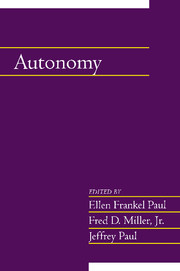Book contents
- Frontmatter
- Contents
- Introduction
- Acknowledgments
- Contributors
- Stoic Autonomy
- Autonomous Autonomy: Spinoza on Autonomy, Perfectionism, and Politics
- Kant on the Theory and Practice of Autonomy
- How Much Should We Value Autonomy?
- Autonomy, Duress, and Coercion
- Autonomy and Hierarchy
- Reason and Autonomy
- Identification, the Self, and Autonomy
- Some Tensions between Autonomy and Self-Governance
- Autonomy from the Viewpoint of Teleological Behaviorism
- The Paradox of Group Autonomy
- Abortion, Autonomy, and Control over One's Body
- Freedom as a Political Ideal
- Index
How Much Should We Value Autonomy?
Published online by Cambridge University Press: 06 July 2010
- Frontmatter
- Contents
- Introduction
- Acknowledgments
- Contributors
- Stoic Autonomy
- Autonomous Autonomy: Spinoza on Autonomy, Perfectionism, and Politics
- Kant on the Theory and Practice of Autonomy
- How Much Should We Value Autonomy?
- Autonomy, Duress, and Coercion
- Autonomy and Hierarchy
- Reason and Autonomy
- Identification, the Self, and Autonomy
- Some Tensions between Autonomy and Self-Governance
- Autonomy from the Viewpoint of Teleological Behaviorism
- The Paradox of Group Autonomy
- Abortion, Autonomy, and Control over One's Body
- Freedom as a Political Ideal
- Index
Summary
INTRODUCTION
Autonomy generally is a valued condition for persons in liberal cultures such as the United States. We uphold autonomous agents as the exemplar of persons who, by their judgment and action, authenticate the social and political principles and policies that advance their interests. I will begin by examining the concept of autonomy in Section II of this essay. In Section III, I will explore the idea that autonomy is valued because autonomous agents are persons whose judgment and actions serve to advance their interests in a democratic society. But the focus of this essay is on the phenomenon, which is not implausible in a culture such as that of the United States, of being “blinded” by the ideal of autonomy. What happens if we value autonomy too much?
I will examine three possible outcomes. One, our commitment might lead us to believe, falsely, that all persons deserve autonomy, such that incursions of autonomy are never justified. This situation can be avoided once we settle upon a class of persons who, by their conduct, deserve protection of their autonomy. This classification rests on a negative test for desert modeled on John Stuart Mill's harm principle. Section IV will be devoted to an exploration of this issue.
A second problematic outcome arises when the premium that we place upon autonomy is tested by the very independence that it secures for us.
- Type
- Chapter
- Information
- Autonomy , pp. 99 - 126Publisher: Cambridge University PressPrint publication year: 2003
- 12
- Cited by



